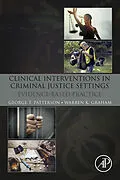Clinical Interventions in Criminal Justice Settings balances theoretical frameworks and research methodology to examine the effective evidence-based practices and principles for populations within the criminal justice system. The book explores the major clinical issues that are relevant for adopting evidence-based practices and demonstrates how to implement them. Topics include legislation, law enforcement, courts, corrections, actuarial assessment instruments, treatment fidelity, diverse populations, mental illness, substance use and juvenile delinquency. Clinical Interventions in Criminal Justice Settings models opportunities for evidence-based practice during entry into the criminal justice system (arrest), prosecution (court, pretrial release, jail, and prison), sentencing (community supervision, incarceration), and corrections (jail, prison, probation and parole). - Addresses offenders in all four components of the criminal justice system-legislation, law enforcement, courts and corrections - Covers the use of actuarial risk assessment instruments for clinical decision-making - Includes tools that predict recidivism, levels of service needed, and future offending behavior - Separates specific practices for juvenile and adult offenders - Delves into specific special populations, such as those with HIV and AIDS, substance abuse, co-occurring disorders and homelessness
Autorentext
Dr. George T. Patterson is the author of the book Social Work Practice in the Criminal Justice System, and has also published numerous criminal justice-related articles. Dr. Patterson has both research evaluation experience on numerous federal grants, such as the Department of Justice, assessing evidence-based practice and best practices. He has extensive clinical experience in varied components of the criminal justice system. He is a NYS certified police instructor, police social worker, NYS Licensed Clinical Social Worker, and provides criminal justice-related training to numerous agencies.
Klappentext
Clinical Interventions in Criminal Justice Settings balances theoretical frameworks and research methodology to examine the effective evidence-based practices and principles for populations within the criminal justice system. The book explores the major clinical issues that are relevant for adopting evidence-based practices and demonstrates how to implement them. Topics include legislation, law enforcement, courts, corrections, actuarial assessment instruments, treatment fidelity, diverse populations, mental illness, substance use and juvenile delinquency.
Clinical Interventions in Criminal Justice Settings models opportunities for evidence-based practice during entry into the criminal justice system (arrest), prosecution (court, pretrial release, jail, and prison), sentencing (community supervision, incarceration), and corrections (jail, prison, probation and parole).
- Addresses offenders in all four components of the criminal justice system-legislation, law enforcement, courts and corrections
- Covers the use of actuarial risk assessment instruments for clinical decision-making
- Includes tools that predict recidivism, levels of service needed, and future offending behavior
- Separates specific practices for juvenile and adult offenders
- Delves into specific special populations, such as those with HIV and AIDS, substance abuse, co-occurring disorders and homelessness
Inhalt
1. Introduction to Evidence-based Practices and Principles in the Criminal Justice System 2. Using Evidence to Inform Clinical Practice 3. An Overview of Implementation Fidelity 4. Clinical Outcomes for Criminal Justice Populations 5. The Evidence-Based Rating and Classification Process 6. Risk Assessment and Treatment Levels 7. Evidence-Based Practices for Juveniles in the Juvenile Justice System 8. Evidence-Based Practices for Adults in the Criminal Justice System 9. Evidence-Based Practice With Special Criminal Justice Populations 10. Implementing Evidence-Based Practices and Principles With Criminal Justice Populations 11. Criminal Justice Initiatives Using Evidence-Based Practices and Principles Appendix: Resources for Evidence-Based Criminal Justice Practice
